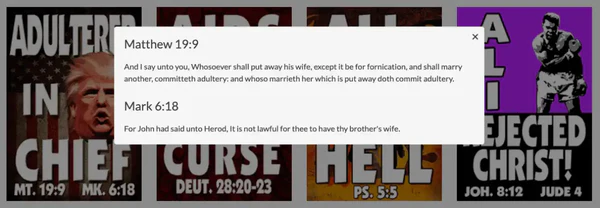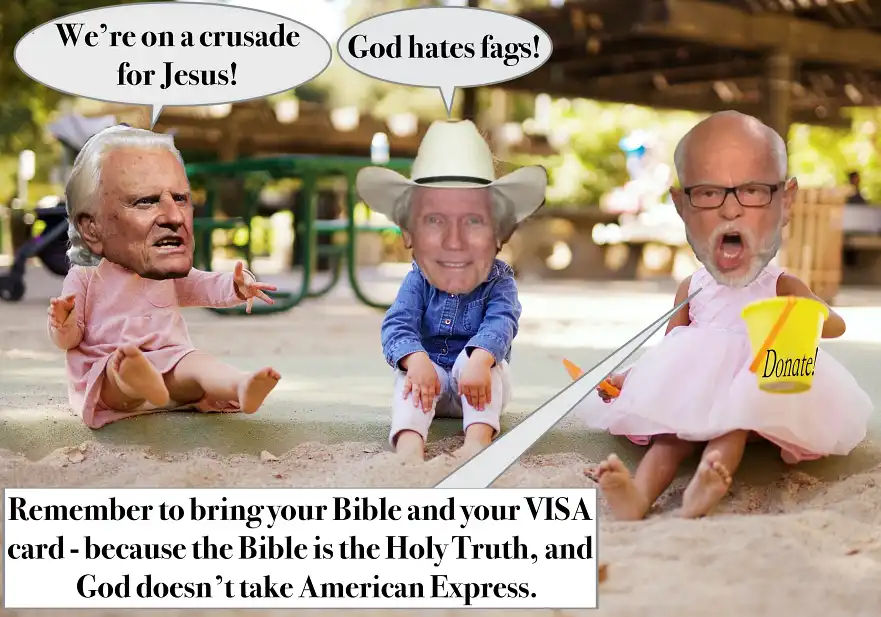If ever you wondered how angry, screaming evangelists; lunatic preachers; racist, right-wing pastors; and other hate-filled Christians amass large audiences, look no further than Westboro Baptist Church. Despite its smallness, the church gained media attention for offensive protests of dead soldiers and, most notably, for its mantra, "God hates fags!" Popular culture named Westboro “the most hated church in America,” and Christians clamored disapproval, yet, this despised group of Christians survived a long time and continues surviving. The truth, something Christians seem to avoid like the plague, reveals Westboro not as a reviled offshoot of true Christianity but as a red-flashing warning to avoid Christianity entirely.
Christianity’s Pathology
Westboro Baptist proves the danger of Christian belief, and not for merely representing the religious-infected mind, but because Christianity’s pathology causes one to hold the sign, “God hates Fags,” while believing themself a good person.
Critics falsely assume Westboro is an outlier of the supposedly loving religion, and Christianity's misuse or misinterpretation is to blame. This view is nonsense. Countless evangelists speaking slightly sanitized versions of Westboro's message maintain flocks in the millions. Recent studies show many people continue to abandon Christianity (at least Churches), while more radical, right-wing Christian groups continue to grow in what Guardian reporter Ruth Braunstein described as a "counter-backlash,"
White evangelical Christians believe that they are being illegitimately persecuted and are increasingly invested in the boundary between the perceived morally righteous and their enemies.
Right-wing politics is not the sole symptom, as Christians display many cognitive and behavioral features; condescension, hypocrisy, passive-aggressiveness, irrationality, racism, and other negative traits trace to the Christian acceptance of implausible ideas. Christians, the more literate ones, always navigate discussions into the realm of philosophy because their religion cannot prove itself in any way other than as a possibility. Lacking any plausibility, this foundation of chance drives poor thinking since (anything is possible), explaining perfectly how diametrically opposed Christian sects exist, rendering all Christian perspectives arbitrary and thus senseless. Worse than meaningless, believers become prone to the fundamentalist viewpoint, like Westboro's adherents.
No Wrong Interpretation
You wouldn’t want a doctor treating your wound based on his interpretation of approved surgical best practices, especially if that perspective denies reality. The Christian Worldview might appear sane and correct if you live in a Christian community. Presbyterians, Catholics, Evangelicals, and the Westboro members all share the Christian moniker and believe they hold a sane view of reality, despite different interpretations that cannot all be correct — just the way medical interpretations cannot all be correct.
Christians get around this problem in a gross exercise of the No True Scotsman fallacy that allows them to confirm some Christians while denying the authenticity of others. Christian scholar, Brother André Marie, reflects this fallacy perfectly in his rejection of the "perseverance of the saints," which ultimately rejects the TULIP doctrine for being, “in this author’s opinion, a unique claim to the name ‘The Devil’s Doctrine.’” He refers to it as “poison to the soul” and “a spiritual AIDS,” and most importantly, as “totally unbiblical and untraditional” so denying it as Christian. Brother Marie, like all Christians faced with stark contrasting claims of their brethren, declares his unsavory siblings "inauthentic Christians." Attacking a primary TULIP tenet using scripture, he rejects Calvinism entirely in a quantifying of contradictory scripture citations.
TULIP also happens to be the cornerstone of Westboro Church’s theological brand, along with many Presbyterians and other Baptists, which might lead you to ask, “Well, what was his argument? What's TULIP?” You might assume Brother Marie’s argument holds importance for showing why Christians should not follow churches like Westboro founded on TULIP.
You are wrong.
You do not need to understand TULIP or Calvinism because they are not the problem or danger Christianity poses for believers. Brother Marie's argument against TULIP, and all other arguments meant to show a person, doctrine, church, or some group's Christian authenticity, assume one believes the implausible religion and whatever discussion concerning that theology: all fallaciously derived from the same bible.
Any argument derived from the bible, however rational, is based on the implausible circumstance of Christianity's truth.
John Calvin, the Protestant reformer, did not pull the TULIP document from his head like a magician's rabbit. Calvinism evolved out of the same interpretation method Brother Marie uses to contradict Calvinism, just the way Fred Phelps' interpretation of scripture and TULIP bore Westboro, which is exactly the way all Christian sects come to be.
Westboro Church is not the result of faith wrongly interpreted but instead another equally insane and accepted view of biblical fiction.
Despite most not reading the Bible, all Christians in some manner adhere to this book: though most just accept what churches, priests, pastors, etc. claim, with a bit of personal spin to justify sins, such as premarital sex, which almost no Christian seems capable of abstaining. No different are the adherents of Westboro, who take a more literal view of scripture like many other Christians abiding by the TULIP doctrine. One might assume Christian bible illiteracy deepens the danger of falling prey to Westboro-like churches, but this is not the case.
The bible, the religion itself, makes Christians prone, not just to Westboro, but to all fundamentalist cults and beliefs.
The Road to Fundamentalism
Again, placing faith in Christianity's implausibility brings many risks, but perhaps the worst danger is fundamentalism. Christianity forms a worldview and way of life founded on obeying scripture and God’s will. Readily, a serious problem appears in the ambiguous, contradiction-filled Bible with multiple translations.
What is the meaning of scripture, and how do I apply these meanings to my life?
These questions explain why Christians hold personal interpretations, divide into sects, and produce belief systems such as Westboro Church, which appears to contradict mainstream Christianity. This appearance of contradiction is an illusion since there exists no standard on which to judge the veracity of a biblical interpretation.
Anyone armed with a bible, an opinion, and endurance to cherry-pick passages can claim the title Christian and start a church based on their beliefs — no matter how loathed by the majority.
The bible’s nature obfuscates meaning, resulting in Christians, scholars, and laypersons interpreting scripture in different ways, but most notably, they engage in a bizarre quantification of passages, representing whatever “truth" sought, weighed by volume against opposing, contradictory bible verses (as though this proves something), i.e.,
On the topic of Incest
“Cursed be he that lieth with his sister, the daughter of his father, or the daughter of this mother…” — Deuteronomy 27:22
“And if a man shall take his sister, his father’s daughter, or his mother’s daughter…it is a wicked thing….” — Leviticus 20:17
Supposedly these quotes outweigh the fact that God knowingly allowed incest to occur and even rewarded it,
“And God said unto Abraham, As for Sara thy wife…I bless her, and give thee a son also of her…” — Genesis 17:15-16
This example borrowed from American Atheists often appears in arguments between theists and atheists but also amongst Christians attempting to reconcile the bible with reality. They argue the number of passages, then explain away the contradictions with symbolism or some other method of interpretation — highlighting the true meaning. (One would, evidently, wrongly assume a being of infinite intellect would know to speak to his inferior creations with clarity to ensure understanding of His will.) The heart of the problem rests not in the interpretation since anyone can find scripture to back what they say, evidenced by Brother Marie’s argument against Calvinism and TULIP, which is every bit as valid as the late Fred Phelps, or anybody’s, for that matter. Instead, the issue of falling prey to radical fundamentalist thinking centers on the desire or need for truth.
On the Christian StackExchange and other sites, you can find similar discussions showing the depth of Christian need to understand their religion’s contradictions. So it should be since they attempt to live by these beliefs and attain salvation, but this truth-seeking derails in faith’s flaws. Assuming the bible is true leads believers on a journey to find rational evidence in the book born of the implausible religion. Worse than condemning the believer to endless, arbitrary interpretations, they become prone to fundamentalism.
The more faith you place in Christianity, the more you risk becoming Fred Phelps.
If God inspired the bible, logic or illogic dictates the book is true — entirely. If you start picking apart the bible and interpreting passages, you render the book meaningless, especially when using scripture as proof. Anyone who interprets the book will eventually face their own illogic or someone who interprets it differently. The liberal Christian may come into contact with the right-wing evangelical, or any Christian may suffer a crisis of faith due to some life circumstance that challenges personal or church doctrine. Whatever the cause, the Christian continues reinterpreting the bible for every circumstance, abandons the belief, or chooses scripture inerrancy. These outcomes provide a likely reason for Christianity losing members while right-wing evangelicalism is on the rise. Those who reject the implausibility of the religion choose to leave churches, while those incapable of disengaging faith take the easy road.
Fundamentalism is easy since nothing means anything other than belief in God and the bible.
If the bible is true, you do not have to explain anything. You can take away a woman’s right to her body, oppose the death penalty, or support capital punishment because the proof is right there in the scripture. You can commit yourself to any contradictory behavior or word without care because God's truth is not up to you to decide. (Explains perfectly why right-wing evangelicals and many other Christians are so comfortable in their hypocrisy.) Fundamentalism is the ultimate surrender to mindlessness, but it is the easier road of faith.
In a Christian community, fundamentalists are rarely shunned or told they are wrong; if anything, they are role models. Only in the worst possible cults and outrageous behavior do Christians cry foul!
Fundamentalism lets you carry signs backed by scripture, like this,

the same way other Christians justify racism with the bible, like this,

and overthrow of government, like this,

Fundamentalism allows believers to indulge and feel good about every racist, classist, bigoted, violent part of themselves justified by living God’s truth. The supposed “authentic” Christians who disagree can’t do anything because fundamentalists have the same right to claim themselves true Christians. If anything, they are better Christians since they live the bible verbatim as much as possible, and many Christians honor them for it.
You don’t see Catholics and liberal Christians protesting outside the Westboro Baptist Church, do you?
You don’t see Christians en masse protesting churches like Westboro or any fundamentalist sect because the religion must accept them. Westboro, right-wing churches, and cults are the most honest Christians, willing to act on their justified hate by having greater faith in the word of God, however implausible. While not every Christian is a mindless, right-wing, fundamentalist, evangelical extremist; every mindless, right-wing, fundamentalist, evangelical extremist is a Christian.
The only truth discovered by deepening Christian faith is the wisdom to justify every wrong.
Tyler Merbler from USA, CC BY 2.0, via Wikimedia Commons
Confederate till Death at English Wikipedia, CC BY-SA 3.0, via Wikimedia Commons































































































